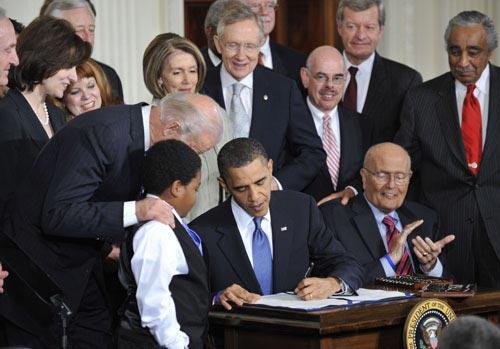Obama signs landmark healthcare reform bill
2010-03-24 08:04 BJT
WASHINGTON, March 23 (Xinhua) -- U.S. President Barack Obama on Tuesday signed a sweeping healthcare reform bill that passed the House of Representatives on Sunday night, on track to bring the most profound changes to the nation's social security system in more than four decades.
 |
| U.S. President Barack Obama (C) signs the healthcare reform bill at the White House in Washington D.C., capital of the United States, March 23, 2010. (Xinhua/Zhang Jun) |
Obama's signature makes the bill, the same as the Senate passed in December, immediately become the law of the land. The House passed the measure in a completely party-line vote of 219 to 212 late Sunday night.
Before signing the bill, the president made remarks at the White House to an audience of House and Senate Democrats who backed the bill as well as ordinary Americans who had sent letters to Obama telling him their struggles with skyrocketing insurance premiums.
"Today after almost a century of trial, today after over a year of debate, today after all the votes have been tallied, health insurance reform becomes law in the United States of America," said Obama.
"It is fitting that Congress passed this historic legislation this week for as we mark the turning of spring, we also mark a new season in America," he added.
The president once again touted the benefits that this historic legislation will bring to the ordinary people starting this year, including providing tax credits to help small businesses get and keep coverage for their employees; prohibiting insurers from denying coverage to children because of pre-existing medical conditions; barring insurance companies from dropping coverage when people get sick or putting lifetime limits on coverage.
"The bill I'm signing will set in motion reforms that generations of Americans have fought for and marched for and hungered to see," he said.
Later in the day, Obama will head to the Interior Department for an even larger celebration, in which he will address to an audience of approximately 600 people comprising members of Congress, government officials, doctors, nurses, as well as Americans with healthcare challenges.
The president's signature also set the stage for the Senate debate of a separate compromise package of changes to the Senate bill. Only when the Senate bill was signed into law can the fixes bill, formally known as reconciliation bill, be debated on the Senate floor, according to officials.
The reconciliation bill is not allowed to be filibustered, and that is why Democrats resorted to this legislative maneuver after they no longer have the filibuster-proof 60 votes in the Senate.
Signing the bill does not mark an end to Obama's healthcare overhaul efforts, as he still needs to convince the still- skeptical public that the measure will do them more good than bad.
Obama is expected to give a speech on Thursday in Iowa City, Iowa, where he launched his grassroots drive for healthcare reform in May 2007.
Related stories
- US House approves healthcare reform bill 2010-03-22
- Countdown for Obama's healthcare reform 2010-03-16
- Obama sends education reform bill to Congress 2010-03-16
- Obama urges healthcare reform 2010-03-16
- Obama presses insurance companies, Democrats on healthcare reform 2010-03-05

 Mail
Mail Share
Share Print
Print


 Video
Video









 2009 China Central Television. All Rights Reserved
2009 China Central Television. All Rights Reserved